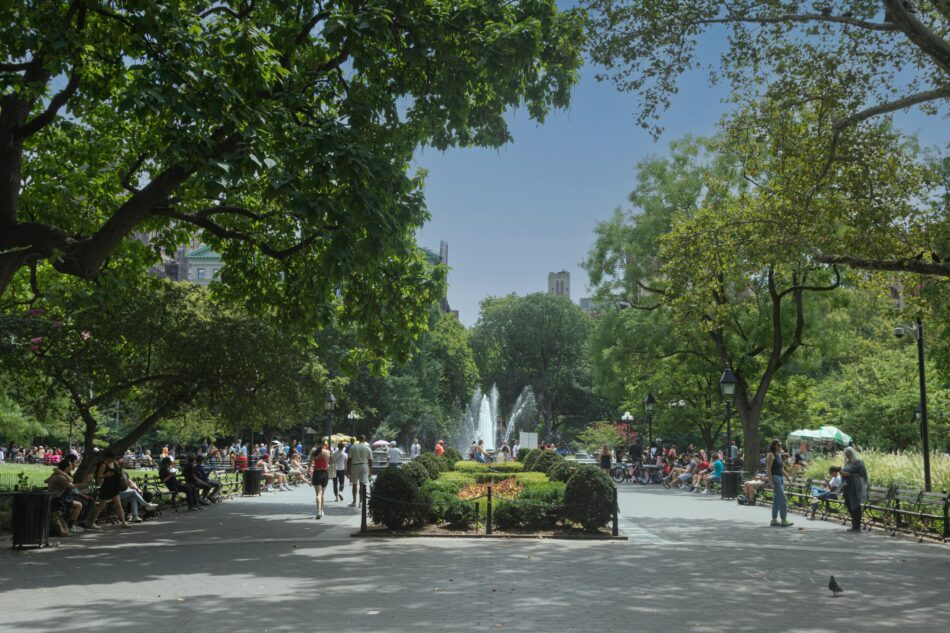Sitting on a bench in Washington Square Park, Radhames Carela, 22, watched as the last of the Israel-Hamas protesters lingered.
“Proud is kind of hard to say,” said Carela. “Because while I’m very grateful for everything we have here, it’s easy to look over all the rights we have here in the US compared to other countries. But I think with that comes a lot of responsibility. Personal responsibility. That we have to try to maintain the American spirit.”
Born and raised in New York City, Carela recognizes the privileges he has around him. He also recognizes what’s going on in the world and thinks it will be very hard for one political candidate alone to make major changes in the world.
“The whole Israel-Palestine thing. I think we haven’t pushed for peace enough there,” Carela said. “The military is not going to come to your door if you talk against the government. Nothing like that’s going to happen. So I say I’m proud in that aspect that we have that, but I’m not proud of all the funding certain militaries do to certain bad things.”
In a recent study conducted by Gallup News in July 2024, 67 percent of Americans claim to be extremely or very proud, which is among the lowest in Gallup’s trend. Each year from 2001 to 2017, at least 75 percent of US adults claimed to be extremely proud of their country.
Gallup News analyzed this trend among partisan lines, finding that 59 percent of Republicans claim to be extremely proud to be American, compared to 34 percent of Democrats and 36 percent of Independents.
Steven Romel, 73, grew up in a very different time. When he was growing up, he said, he was proud to be American — and an Italian-American. Now, he described himself as “humbly proud,” especially in this ever changing world.
Romel has lived in New York for the majority of his life, but has also lived in different parts of the country. As he spoke on how his identity has changed since the 1970s, his demeanor changed. When he described his youth, he spoke with excitement and conviction. When he spoke about the present, he was timid.
“It’s risky out there,” said Romel. “It’s traumatic. I would think that big, big things are gonna happen. I don’t know for good or for bad, though. It’s hard to know who to believe when the politicians are talking on TV and what have you and they’re each calling each other liars and cheats and thieves. I’m befuddled.”
Romel said he now considers himself proud, but with a grain of salt. He grew up in the age of rock and roll and remembered that the world used to be more conservative. He has traditionally voted Republican, but now has found himself distrusting Donald J. Trump.
“I really didn’t have any,” Romel said of his political views. “I didn’t want to go fight in the Vietnam War. That was my lifestyle, just having fun.”
Since then, Romel said the world has also “become a lot more liberal.”
Emma Rosenberg, a Faculty Fellow at the Center for European and Mediterranean Studies at New York University, specializes in the intersection of nationalism, religion and politics.
“I think what is seen by others as patriotic has become more conservative and more ethno-nationalist, more white and Christian,” said Rosenberg. “But I think patriotism is a standard that doesn’t change. It’s just what’s accepted.”
Rosenberg studies the far-right in Europe, but she is now looking at the U.S. as well. The history of the far-right in the US can be compared to the likes of Europe, she said, and those similarities can be seen with patterns in patriotism as well.
“If you want to talk about the start of the far-right, or even the, the far-right of the 1980s, really, you’re looking at the aftermath of the Vietnam war,” Rosenberg said. “You have a lot of soldiers coming home, feeling very unvalued and betrayed by the government. And this has been very, very similar to the aftermath of World War I in Germany.”
Trust in the government and patriotism for the U.S. go hand in hand, dating back to the handling of wars throughout history. This feeling of pride in the country has fluctuated, with nearly 90 percent of the population saying they were proud to be American under Reagan’s early presidency. That number dropped to 67 percent by 1987, according to the Roper Center for Public Opinion Research.
Trump has pushed far-right rhetoric back into the limelight, his followers emboldened by his political presence. Rosenberg says the differences between patriotism in the past and current is that now the far-right is also more religious.
“Under Donald Trump and even a little before that with the emergence of the Tea Party, which is, you know, harkens back to our revolutionary war era roots,” Rosenberg said. “I think the mainstreaming of the far-right has meant that far-right battle cries fall under patriotic umbrellas.”
On the other side of the spectrum, many argue that we now live in an era of “wokeness” — people seeing systemic issues in society, and aiming to fix them. While being woke has come about more recently, it is still rhetoric used openly by politicians and looks to the changing ways of American society.
American society is complex and ever-changing, and the ideals of what’s patriotic and what’s not change with the times. As we see more of the extremes of the political system rise, our view of the country and ourselves in the country will continue to evolve.
“I’m proud to be an American because we have rights that we can preserve and we can spread to other countries who need them,” said Carela. “But I say our methods are flawed. Our methods are flawed but as a country, as a foundation of our country, we can make things better. We can. We haven’t been doing such a good job but hopefully we will change that.”



